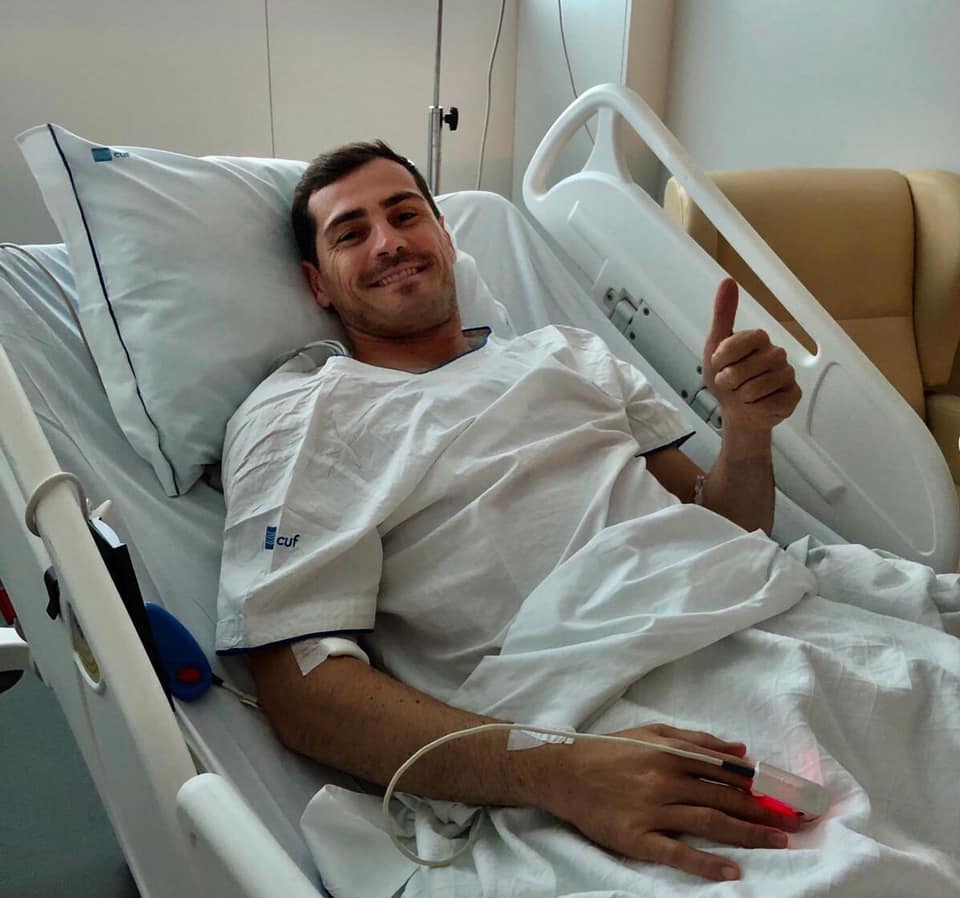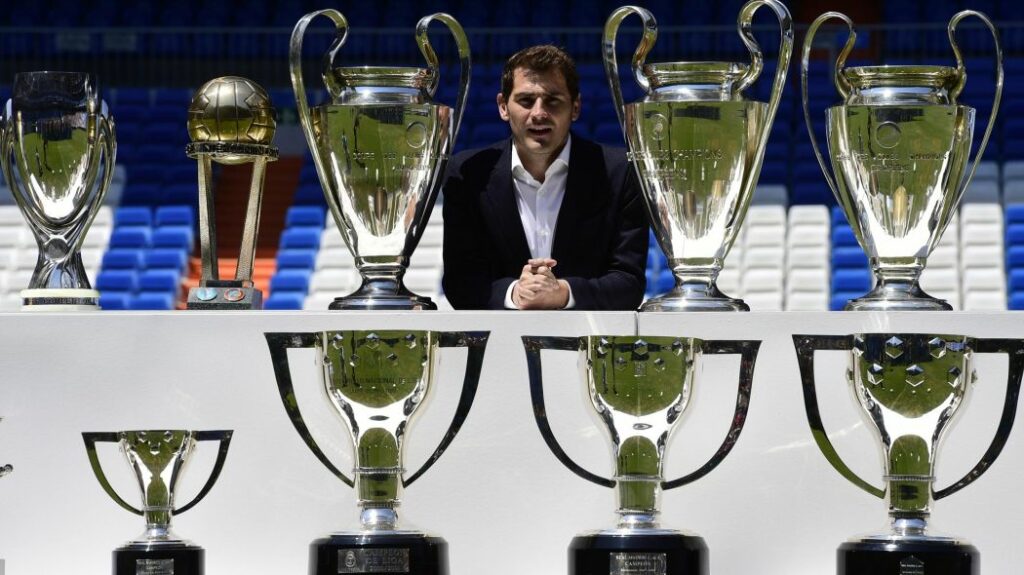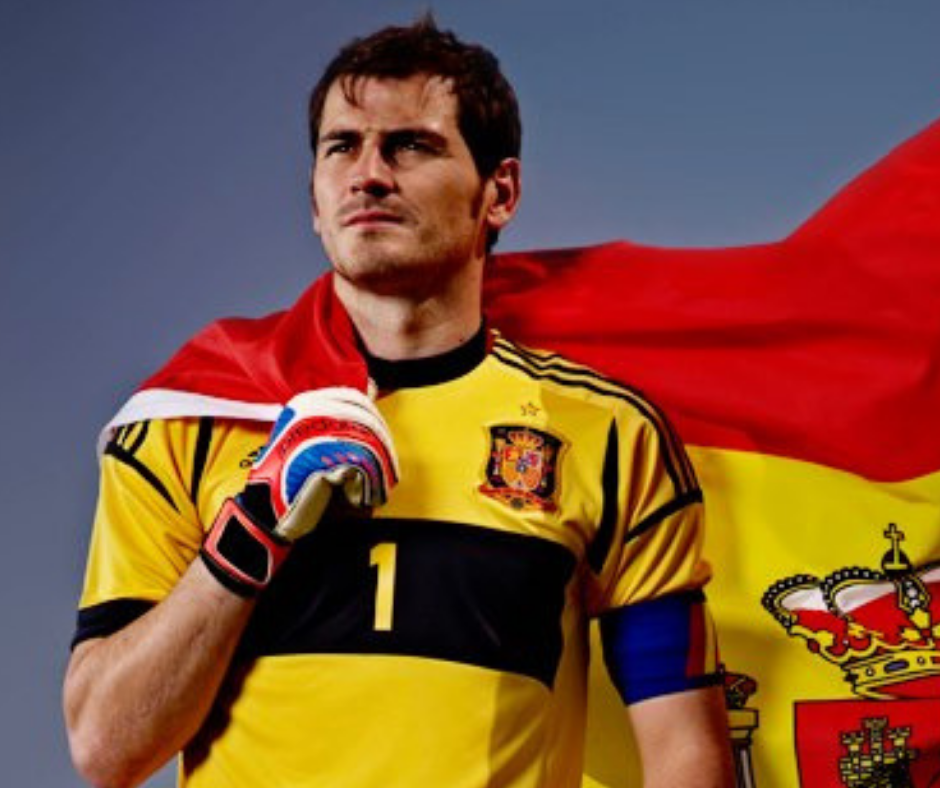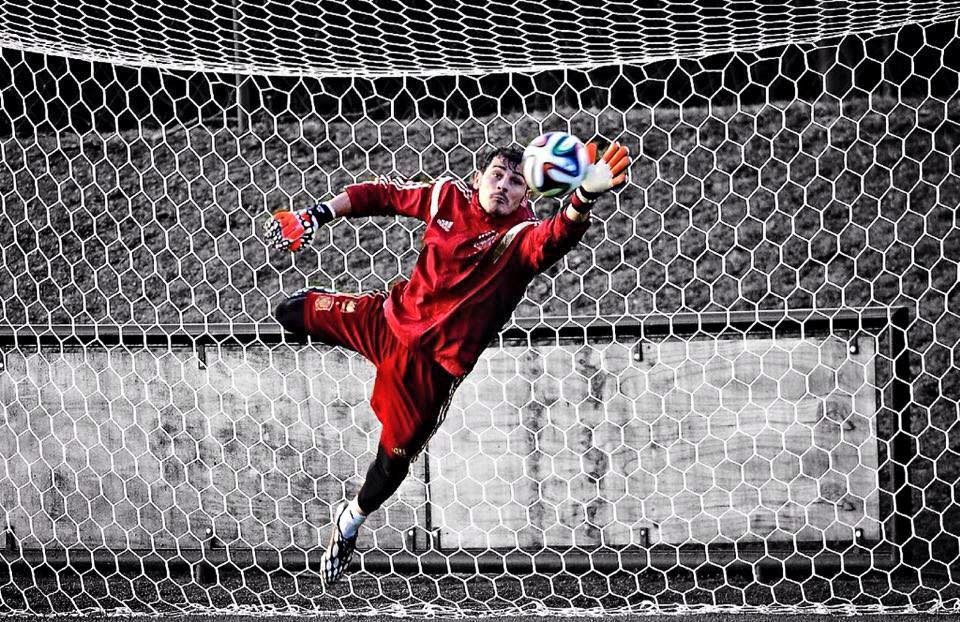Iker Casillas, 5 times World’s Best Goalkeeper, achieved the greatest victory of his life. On the opposite side was a heart attack, a ruthless enemy who takes millions of lives a year, but once again, “San Iker” shows us that he is a true champion, he survived that fight and took the biggest victory of his astonishing career.

How did all start?
The day was May 20, 1981. On lazy, sunny, Wednesday afternoon, in the second-largest city in population belonging to the autonomous community of Madrid, 18 kilometers southwest from central, in Mostoles, the legend was born.
Just 16 years later, he was first called up to the senior team squad to face Rosenborg in the UEFA Champions League. In starting the 1999-2000 UEFA Champions League group stage fixture against Olympiakos on 15 September 1999, he became the youngest goalkeeper ever to feature in the competition at the time, aged 18 years and 177 days. Casillas had made his La Liga debut in a 2–2 draw against Athletic Bilbao at San Memes Stadium. In May 2000, he became the youngest ever goalkeeper to play in and win a Champions League final when Real Madrid defeated Valencia 3-0, just four days after his 19th birthday.
Real Madrid – the biggest chapter
Casillas began his career in Real Madrid’s youth system, during 1990 – 91 season. For the next 16 years he was the central part of the team. During his time in Real, Iker has won literally everything that football goalkeeper can win.
- 5x Spanish champion (00/01, 02/03, 06/07, 07/08, 11/12)
- 3x Champions League winner (99/00, 01/02, 13/14)
- 2x Spanish cup winner (10/11, 13/14)
- 4x Spanish Super Cup winner (01/02, 03/04, 08/09, 12/13)
- 2x FIFA Club World Cup winner (2014, 2015)
- 3x Intercontinental Cup winner (1998, 2002, 2003)
- 2x Uefa Supercup winner (02/03, 14/15)

Honestly, I don’t have to use up many words to say how good he is,
Gianluigi Buffon on Casillas prior to the UEFA EURO 2012 Finalthe results are there for all to see. He has won everything there is to win and has been on the same great level for so many years now, whichis possibly hardest of all for a goalkeeper. Spain almost neverconcede goals and Casillas is the main reason for that.

International career
Casillas debuted for Spain at the under-17 level. At age 16, he was the youngest player in the Spanish squad that placed third at the 1997 FIFA U-17 World Championship in Egypt. Two years later, he went on to win the FIFA World Youth Championship and the UEFA-CAF Meridian Cup that same year. As a senior, he debuts for Spain national team on EURO 2000.
Casillas is currently the most capped player in the history of the Spain national team. Following his full international debut at the senior level on 3 June 2000 against Sweden (at 19 years and 14 days), Casillas was an unused substitute at UEFA Euro 2000. He was part of the roster for the 2002 FIFA World Cup, initially as the understudy to Santiago Cañizares. Coincidentally, he became first-choice when Cañizares had to withdraw from the tournament due to injury from a freak accident. At 21, Casillas was one of the youngest first-choice goalkeepers in the tournament. He played an instrumental role in Spanish progression when he saved two penalties in the shoot-out during the round of 16 match against the Republic of Ireland, earning him the nickname “The Saint”. One of his saves during the quarter-final against South Korea during the 2002 World Cup was rated by Fifa as one of the top ten saves of all time.
Unfortunatlly for Iker and Spain, on Euro 2004 and World Cup 2006, they did not well. They lost their matches in the Round of 16. After that, the beast has been awakened. From 2008. to 2012. Iker Casillas was the best goalkeeper in the world. He won that title 5 years in a row and in that period, Spain has won 2008 European Championship, 2010 FIFA World Cup and 2012 EURO. In June 2014, Casillas was selected to represent Spain in his fourth World Cup. On 5 September 2015, Casillas kept a clean sheet in his 100th game as Spain’s captain. On 31 May, Casillas was named to Vicente del Bosque’s final 23-man Spain squad for Euro 2016. The following day, he became the most-capped European player by earning his 167th cap in a 6–1 friendly win over South Korea.

After finishing his career in Real Madrid, in 2015, Iker moved to FC Porto and won Portuguese champion in 2017/18 and 2 times Portuguese Super Cup in 2018. and 2019. 1
But on the first may we were all witnesses of a terrible event.
The 37-year-old goalkeeper suffered the heart attack during training on Wednesday morning and he was immediately escorted to a local hospital.
Iker Casillas suffered an acute heart attack during Wednesday morning’s training session,” Porto said in a statement.
“The training session was promptly interrupted to provide assistance to the Porto goalkeeper, who is currently at the Hospital CUF Porto.
“Casillas is doing well, he’s stable and his heart problem has been resolved.”
Let’s take closer look what actually happened.
Sudden death in people younger than 35, often due to undiscovered heart defects or overlooked heart abnormalities, is rare. When these sudden deaths occur, it’s often during physical activity, such as playing a sport, and more often occurs in males than in females.1
Millions of elementary, high school and college athletes compete yearly without incident. If you or your child is at risk of sudden death, talk to your doctor about precautions you can take.
How common is sudden cardiac death in young athletes?
Most deaths due to cardiac arrest are in older adults, particularly those with coronary artery disease. Cardiac arrest is the leading cause of death in young athletes, but the incidence of it is unclear. Perhaps 1 in every 50,000 sudden cardiac deaths a year occurs in young athletes.
What can cause sudden cardiac death in young people?
The causes of sudden cardiac death in young people vary. Most often, death is due to a heart abnormality.
For a variety of reasons, something causes the heart to beat out of control. This abnormal heart rhythm is known as ventricular fibrillation.
Some specific causes of sudden cardiac death in young people include:
- Hypertrophic cardiomyopathy (HCM). In this usually inherited condition, the walls of the heart muscle thicken. The thickened muscle can disrupt the heart’s electrical system, leading to fast or irregular heartbeats (arrhythmias), which can lead to sudden cardiac death.Hypertrophic cardiomyopathy, although not usually fatal, is the most common cause of heart-related sudden death in people under 30. It’s the most common identifiable cause of sudden death in athletes. HCM often goes undetected.
- Coronary artery abnormalities. Sometimes people are born with heart arteries (coronary arteries) that are connected abnormally. The arteries can become compressed during exercise and not provide proper blood flow to the heart.
- Long QT syndrome. This inherited heart rhythm disorder can cause fast, chaotic heartbeats, often leading to fainting. Young people with long QT syndrome have an increased risk of sudden death.
1
Other causes of sudden cardiac death in young people include structural abnormalities of the heart, such as undetected heart disease that was present at birth (congenital) and heart muscle abnormalities.
Other causes include inflammation of the heart muscle, which can be caused by viruses and other illnesses. Besides long QT syndrome, other abnormalities of the heart’s electrical system, such as Brugada syndrome, can cause sudden death.
Commotio cordis, another rare cause of sudden cardiac death that can occur in anyone, occurs as the result of a blunt blow to the chest, such as being hit by a hockey puck or another player. The blow to the chest can trigger ventricular fibrillation if the blow strikes at exactly the wrong time in the heart’s electrical cycle.
Are there symptoms or red flags parents, coaches and others should be on the lookout for that signal a young person is at high risk of sudden cardiac death?
Many times these deaths occur with no warning, indications to watch for include:
- Unexplained fainting (syncope). If this occurs during physical activity, it could be a sign that there’s a problem with your heart.
- Family history of sudden cardiac death. The other major warning sign is a family history of unexplained deaths before the age of 50. If this has occurred in your family, talk with your doctor about screening options.
Shortness of breath or chest pain could indicate that you’re at risk of sudden cardiac death. They could also indicate other health problems in young people, such as asthma.
Can sudden death in young people be prevented?
Sometimes. If you’re at high risk of sudden cardiac death, your doctor will usually suggest that you avoid competitive sports. Depending on your underlying condition, medical or surgical treatments might be appropriate to reduce your risk of sudden death.
Another option for some, such as those with hypertrophic cardiomyopathy, is an implantable cardioverter-defibrillator (ICD). This pager-sized device implanted in your chest like a pacemaker continuously monitors your heartbeat. If a life-threatening arrhythmia occurs, the ICD delivers electrical shocks to restore a normal heart rhythm.
Who should be screened for sudden death risk factors?
There’s debate in the medical community about screening young athletes to attempt to identify those at high risk of sudden death.
Some countries such as Italy screen young people with an electrocardiogram (ECG or EKG), which records the electrical signals in the heart. However, this type of screening is expensive and can produce false-positive results — indications that an abnormality or disease is present when it isn’t — which can cause unnecessary worry and additional tests.
It’s not clear that routine exams given before athletes are cleared to play competitive sports can prevent sudden cardiac death. However, they might help identify some who are at increased risk.Paragraph
For anyone with a family history or risk factors for conditions that cause sudden cardiac death, further screening is recommended. Repeat screening of family members is recommended over time, even if the first heart evaluation was normal.
If you are having problems with psoriasis you should try Psorilax

